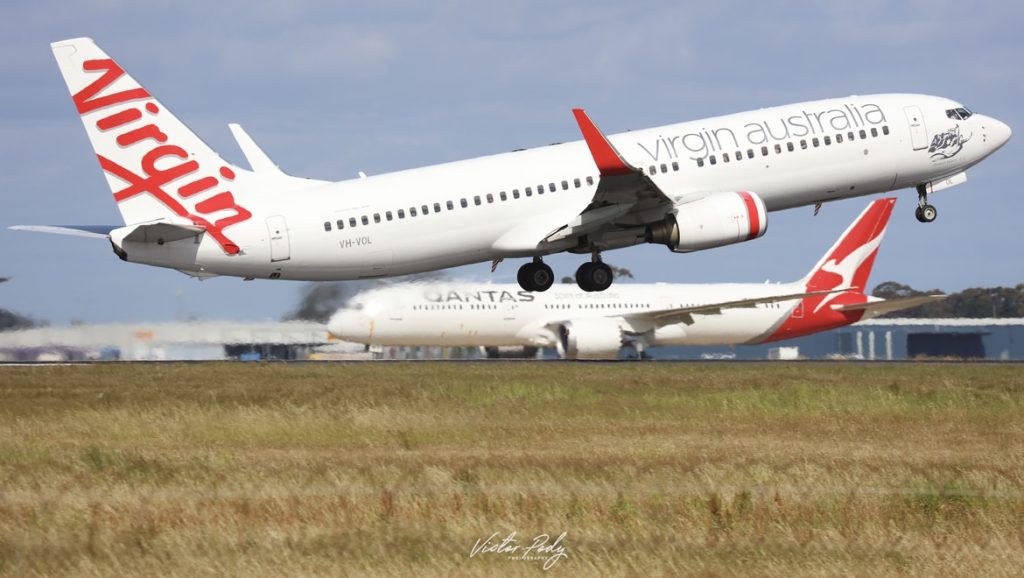
Virgin chief executive Jayne Hrdlicka has said her reborn airline won’t put up a fight to secure all of ex-subsidiary Tiger’s customer base in the future.
Speaking at the CAPA Australia Pacific Aviation Summit on Wednesday, Hrdlicka reiterated that Virgin is content to control just one-third of Australia’s domestic market and won’t look to grow too much larger than its pre-COVID market share, despite the demise of budget carrier Tiger.
“We’re very clear about who we appeal to,” Hrdlicka said. “And we’re really confident about where we can succeed.
“We’re not looking to clip anybody’s lunch, 33 per cent of the market is about right [for us].”
Pre-COVID, and prior to Virgin entering voluntary administration, Virgin Australia held 31 per cent share of the domestic market, while Tiger had about seven per cent share.
“So we’ll take not quite a third of Tiger’s market share, which were guests that are more appropriate for us than for Tiger, and that sort of balances it all out,” she said.
“There’s a gap left by Tiger pulling out of the marketplace and we’re taking part of that gap and we’re leaving the rest of it because we think it’s more appropriate for others.”
Meanwhile, major rival Qantas has continued to suggest that it intends to claim 70 per cent of the domestic market share, despite Virgin already knocking the Flying Kangaroo’s share down from 74 to 69 per cent between December 2020 and March 2021, after just exiting administration. Virgin increased its own share of the domestic market from 24 to 28 per cent.
Hrdlicka also revealed at the CAPA event that Virgin still has “quite a lot of growth yet in us”, with plans to continue expanding its fleet and network over the coming year.
“We started in November of 2020 as a new business with 56 Boeing 737 NGs and we’ve just announced another seven coming into the fleet, so we’re at 84 B737 NGs and we’re not done yet, we have quite a lot of growth yet in us.”
“We fully intend to be 33 per cent of the domestic market, and we intend to be quite a strong player in the short-haul international market with primary focus on New Zealand, Fiji and Bali in the first instance.
“So we’ll see where that takes us. We also intend to have a strong and robust international market more broadly.”
Hrdlicka added that whether or not the newly reborn Virgin will return to long-haul flight operations or not is “an open question”.
“But we will have strong partnerships, as we have had historically, and will have in the future, which is both an important part of our value proposition to our guests but also an important part of the Velocity proposition to its members.”
In November, Virgin announced it had signed letters of intent to welcome an additional seven Boeing 737 Next Generation aircraft to its fleet, and its plans to stand all of its staff back up to their positions by December.
The airline has also said it will begin recruiting for “hundreds of new roles” in preparation for an increase in flight demand, as Australia begins to ease its remaining border restrictions.
It came just one year after Virgin was officially relaunched under the ownership of Bain Capital, and 19 months after the struggling airline first entered administration.
Since the airline relaunched one year ago, Virgin has announced plans to increase its 737 fleet by over 45 per cent from 58 to 84 Boeing workhorse jets.
“This fleet growth underlines the confidence we have in the future of our business and the industry generally,” Hrdlicka said at the time. “Vaccination rates are rising, borders are opening, and demand is returning.”
The airline chief executive said she is “really positive” about the current state of planned borders reopening and confirmed Virgin’s intentions to continue snatching market share from its biggest rival, Qantas.
“We have used our time well while the industry was quiet and are well advanced on all aspects of our transformation strategy and we fully intend to continue growing with demand to ensure we operate at roughly 33 per cent of the domestic market,” she said.
“This enables us to continue to deliver the right mix of destinations with high frequency to support both our business and leisure purpose guests. It also means continued jobs growth at Virgin Australia and our team are delighted to be welcoming new family members to the organisation.”
The airline is preparing to welcome an additional 600 new members to its workforce in the coming weeks and months, with advertisements already up across five states for roles in engineering, pit crew, cabin crew and corporate.
















Rod Pickin
says:This could be interesting; The Boss Lady advises that VOZ is at about 31% of the market going for 33% and it is published that QF, (inc JQ?) is at about 69% down from 74%. Frankly I can’t see much change to those figures in the long term so what the blazes are we doing allowing even more carriers access when the only result can be negative for the existing providers. I accept that if the market is 100% covered then there would be concerns from regulators as to competition and service availability for customers but the road ahead as it appears today has far too many potholes and will only cause grief, not progress.
chris
says:I appreciate your concern for the existing “providers”, but provided a new entrant can meet the operational requirements, we are living in a free enterprise environment. Luckily for the travelling public!
Nerdy Nev
says:There’s that word ‘guests’ again.
So annoying when passengers’ are PAYING to be on-board one of their aircraft.
It sounds so incongruous in this Country, it’s laughable.